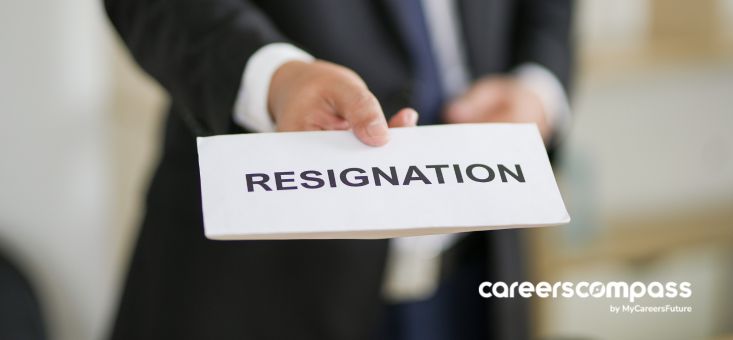There are many reasons to leave a job. You want to explore more opportunities for better career pathways or a career change. Perhaps you need to resign as you find the company culture unsuitable or there is job incompatibility with caregiver duties at home.
Regardless of your reasons, knowing how to resign gracefully and on a positive note from your current position is important. While it is easier to do so when you are working in the office, this is not the same if you work remotely.
Find out how to politely make your resignation official and facilitate a smooth transition while working from home!
There are over 100,000 jobs available on MyCareersFuture. Apply for your next job role here.
1. Write your formal resignation letter
Whether you resign remotely or in person at a resignation meeting, having your resignation letter ready before speaking to your direct manager is extremely important.
This is a formal letter, or statement of resignation that records your intention to leave the company and only upon its submission can all exit processes be enforced. A well-written resignation letter serves as a good follow-up to an initial verbal resignation notice. Some employees may choose to skip the verbal notice and lead directly with a formal resignation letter, but it is always courteous to inform verbally first.
If you are thinking about how to write your resignation letter, you can cover the following:
- Intention to resign
- Last day of employment
- Offer to assist in all exit processes and formalities
- Express gratitude for the time spent in the company
- Provide contact information
- When meeting with your manager in person to resign, they would typically expect a printed copy of your resignation letter.
If you are resigning remotely, simply work on having it ready to be enclosed in your email message, but keep it with you until you have spoken to your boss about this.

2. Email your boss about a good time to speak over a call
Your initial email message is not to inform your boss of your resignation, but rather, it is to check on their availability for a video or phone call to speak about it. It is professional courtesy to personally inform your boss of your intention to leave your current role.
Since you are unable to have a resignation meeting in person, a call with your direct manager is the next best option. Drop an email in the morning with a time to speak during the day – be mindful of your boss’ schedule too.
This should be done with ample time ahead so that you provide your current company with adequate notice to arrange for a smooth transition, and begin hiring for your replacement, if necessary.
3. Plan what you want to say
Planning what to say will ease the tension you face before turning in your resignation letter. If you are thinking about what to say when you resign, here are some pointers:
- First line to say to your boss: This prevents casual talk so you can focus on informing them about your resignation.
e.g. Hello Jen, my reason for setting up this call is to inform you that I intend to resign from my position as a Senior Accountant. - Possible reasons for leaving: While this is not always necessary, it is good to prepare something you can share should your boss ask or to be shared in an exit interview.
e.g. I have worked here for 10 years, and I think I should explore a change to further my career. - What to thank your boss for: This could be anything from appreciation for being a part of your current company or team to the promotions you have been awarded.
e.g. I would like to thank you for having me as part of the team all these years. - How to help the team before you leave: This is to give your boss assurance that you will do a good handover during your notice period and perhaps train a replacement if one is hired in time, with the aim of a smooth transition from your current position.
e.g. I will make the necessary arrangements for a handover. I will be glad to train a replacement if we can hire one a week before my last day. - Questions on formalities: Before you leave, you will need to fulfil certain formalities which your boss or HR should advise you on.
- Last date of employment: While this is stated in your resignation letter, it is good to have your notice period according to your employment contract at the top of your mind should your boss ask.
- What you will do after this call: This is to preempt your boss that you will be sending an email message with your formal resignation letter after the call for them to raise it to their lead or HR.
4. Get on the call
Ensure you have good internet and phone connection. Switch off or mute other applications running in the background to avoid notification sounds. Also, sit in a quiet room away from disturbance.
Pay attention to your tone, especially during phone calls as your boss cannot observe your body language. You want to do this to ensure you maintain a positive relationship with your current employer. It is a good idea to cultivate professional relationships with your past employers even after you’ve moved on to a future employer.
5. Email your resignation letter
After the call, immediately email your resignation letter to your boss and refer to the call you just had. The email will serve as proof of the date and time you gave your resignation in the event this is ever questioned.
Your boss may reply to your resignation letter to formally acknowledge and accept your resignation, and express their well-wishes to you.
Not sure how to get started with writing a professional resignation letter? There are plenty of well-crafted resignation letter templates available online. Take time to customise these to suit your resignation. You can also refer to tips on how to write a clear and cordial resignation letter. The key takeaway when resigning remotely is to keep it professional, and official and depart on a positive note.
















